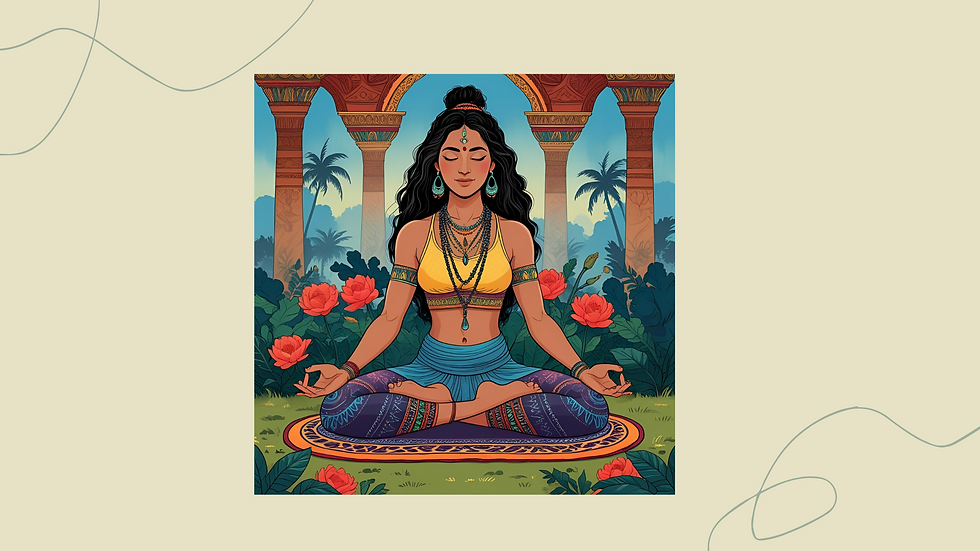How Yoga Supports Decolonization in Communities
- saipanyogacollecti
- Jul 3, 2025
- 3 min read

Yoga as a Path to Decolonization in Our Communities
Yoga, at its root, is a practice of liberation. Born in ancient South Asia thousands of years ago, it was developed as a holistic path toward inner freedom, unity with the self, and connection with the universe. But in many parts of the world, especially in colonized or post-colonial societies, yoga has often arrived disconnected from its roots, stripped of its spiritual and communal essence, and repackaged as a product of wellness culture.
So how can yoga serve the work of decolonization—not just as a personal journey, but as a tool for healing whole communities?
When we practice and teach yoga with intention, cultural respect, and community awareness, we begin to return it to what it was always meant to be: a practice of remembering, reclaiming, and reconnecting.
Reclaiming Our Bodies and Breath
Colonization doesn't only impact land and politics—it impacts the body. In many Indigenous and colonized communities, people were taught to disconnect from their bodies, silence their emotions, and suppress their cultural practices. Yoga helps reverse this process by inviting us back into presence.
Through breath (pranayama), movement (asana), and awareness (dhyana), yoga offers tools for reclaiming embodied wisdom. It helps people feel safe in their bodies again. It creates space to process trauma, regulate the nervous system, and cultivate resilience—not just individually, but collectively.
In places like the Northern Mariana Islands, where colonization has left deep wounds, yoga practiced with care can offer quiet moments of healing, especially when aligned with local values and traditions of connection to land and spirit.
Challenging Western Norms of Wellness
The Western wellness industry often sells yoga as a fitness regimen or luxury escape—clean aesthetics, trendy gear, exclusive studios. But these portrayals center wealth, whiteness, and hyper-individualism—values that often clash with the community-based, spiritual, and non-commercial essence of traditional yoga.
A decolonized yoga practice challenges this narrative.
It:
Centers community care over personal gain.
Makes yoga accessible to all bodies and identities, not just the flexible or affluent.
Values spiritual and cultural integrity over market trends.
Encourages us to listen more than we lead, especially to teachers from historically marginalized lineages.
In community settings, yoga becomes a gathering tool—bringing people together across differences to breathe, grieve, move, and heal in shared space.
Restoring Cultural Integrity and Spiritual Depth
Decolonizing yoga also means reconnecting it to its original roots in South Asian philosophy. This isn’t about gatekeeping or excluding non-Indians from practicing—it’s about honoring the lineage and avoiding cultural appropriation.
This might mean:
Learning about yoga's philosophical foundations (like the Yamas and Niyamas, the Bhagavad Gita, or Patanjali’s Yoga Sutras).
Acknowledging and amplifying South Asian voices and teachers.
Using Sanskrit terms respectfully and understanding their meaning, rather than treating them as trendy phrases.
Being aware of the colonial history of yoga itself, including how it was suppressed or reshaped during British rule in India.
By restoring yoga’s spiritual depth, we move away from empty performance and toward true transformation.
Creating Safe Spaces for Community Healing
In many Indigenous and colonized communities, healing isn't an individual act—it’s relational. People heal in circles. In stories. In ceremony. Yoga, when practiced in ways that respect this, can become a powerful tool for collective restoration.
In the Mariana Islands, for example, offering yoga that integrates cultural respect, place-based awareness, and island values like inafa’maolek (the Chamorro concept of mutual care and balance) allows for yoga to support—not replace—local healing traditions.
Classes can be trauma-informed, inclusive, and culturally grounded. Teachers can facilitate dialogue around land, identity, language, and loss. The space can hold more than just poses—it can hold grief, joy, and resistance.
Toward Collective Liberation
Yoga is ultimately a liberation practice. And liberation, in a decolonial context, means more than inner peace. It means dismantling the systems that created disconnection in the first place—white supremacy, patriarchy, capitalism, and settler colonialism. It means reclaiming space, story, identity, and ancestry.
In that sense, yoga can be part of a larger decolonial movement: one that uplifts Indigenous knowledge, restores relationship with land, and empowers communities to define wellness on their own terms.
Final Thoughts
Yoga won't decolonize a community on its own. But when practiced with humility, justice, and cultural respect, it can be a powerful companion on the path. It can help people reclaim their bodies, their breath, their story, and their connection to the sacred. It can bring people together across generations and identities, reminding us that healing is possible—and that liberation is not just a destination, but a shared journey.
.



Comments